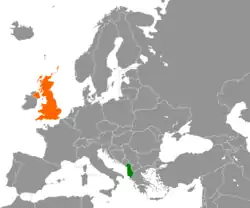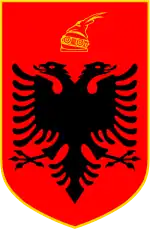 | |
Albania |
United Kingdom |
|---|---|
| Diplomatic mission | |
| Embassy of Albania London | Embassy of Britain Tirana |
Albania–United Kingdom relations are the bilateral relations between Albania and the United Kingdom. Albania has an embassy in London, and the United Kingdom has an embassy in Tirana.
Both countries are members of the North Atlantic Treaty Organization (NATO) and the Organization for Security and Co-operation in Europe (OSCE). Diplomatic relations were established first in 1922, interrupted in 1939 for 51 years, to be re-established in 1991.[1]
History
Zogist era
Diplomatic relations were established first in 1922. The first minister, Sir Henry Eyres, presented his credentials in January 1922. Eyres was succeeded by his successor, Sir Robert Hodgson in 1928 who served until 1936. Relations were interrupted in 1939 after the Italian invasion of Albania.
Relations with the Peoples Republic
The Corfu Channel incident between ships of the Royal Navy and the Albanian Naval Force took place in the Channel of Corfu in 1946 as an early episode of the Cold War and in Anglo-Albanian relations.[2][3] During first incident, Royal Navy ships came under fire from Albanian fortifications passing through the Straits of Corfu.[3] The incident caused Albania to complain to the United Nations,[3] leading to the Corfu Channel case, where the United Kingdom brought a case against the People's Republic of Albania to the International Court of Justice.[4] The Court rendered a verdict under which Albania was to pay £844,000 to the United Kingdom.[5]
As a result of the British broke off talks with Albania aimed at restoring diplomatic relations between the two countries. In 1981, the British Government of Margaret Thatcher proposed to the Albanian Government the restoration of diplomatic relations without preconditions on the matter of reparations, but the Albanian communist authorities did not accept it. The offer remained open and the United Kingdom continued to engage in unconditional talks. In March 1985, in Paris, talks were held on the return of Albanian gold, but they were interrupted by the death of First Secretary Enver Hoxha that month and were not resumed.
Diplomatic relations were only restored on 29 May 1991.[6]
Post-1992
On 8 May 1992, Britain and Albania came to an agreement over the Corfu Channel case, announcing that "Both sides expressed their regret at the Corfu Channel Incident of 22 October 1946"[7][8] and Albania agreed to pay US$2,000,000 in reparations.[7][9][10]
Cooperation
The militaries of Albania and the United Kingdom have cooperated on numerous occasions, including military exercises in 2013 and 2014. The 2013 Albanian Lion exercise involved nearly 1,000 Royal Marines and HMS Bulwark.[11] The 2014 Albanian Lion exercise saw 600 Royal Marines visit Albania.[12]
In 2016, around 1,500 military personnel from the United Kingdom joined Albanian forces for Exercise Albanian Lion.[13]
High level visits
| Guest | Host | Place of visit | Date of visit |
|---|---|---|---|
| London | 12 February 2008 | ||
| Tirana | 18 November 2015[14] |
Agreements
| Dates | Agreement |
|---|---|
| 30 March 1994 |
Agreement for the Promotion and Protection of Investments, Co-operation in the Field of Tourism, Air Services and Education, Science and Culture[15] |
| 14 October 2003 |
Agreement on the Readmission of Persons, with Protocol |
| 26 March 2013 |
Agreement on the Transfer of Sentenced Persons and for the Avoidance of Double Taxation and the Prevention of Fiscal Evasion with respect to Taxes on Income and on Capital |
| 5 February 2021 |
Partnership, Trade and Cooperation Agreement signed to tackle organised crime and to prevent it from spreading in Europe.[16] |
See also
References
- ↑ "Bilateral Relations". Albanian Embassy in the United Kingdom. Retrieved 13 July 2020.
- ↑ Australian Journal of Legal History Half Light Between War and Peace: Herbert Vere Evatt, The Rule of International Law, and The Corfu Channel Case
- 1 2 3 Cook, Bernard A., ed. (2001). "Corfu Channel Incident". Europe Since 1945: An Encyclopedia. Vol. 1. Taylor & Francis. p. 224. ISBN 978-0-8153-1336-6. Retrieved 23 April 2015.
- ↑ JSTOR The Corfu Channel Case Quincy Wright The American Journal of International Law, Vol. 43, No. 3 (July 1949), pp. 491–494 (article consists of 4 pages) Published by: American Society of International Law Retrieved 31-07-08
- ↑ Roselli, Alessandro (2006). Italy and Albania: financial relations in the Fascist period. I.B. Tauris. pp. 136–137. ISBN 9781845112547. Retrieved 30 May 2010.
- ↑ UK in Albania (British Embassy in Albania) Archived 26 September 2008 at the Wayback Machine
- 1 2 Australian Journal of Legal History Half Light Between War and Peace: Herbert Vere Evatt, The Rule of International Law, and The Corfu Channel Case
- ↑ UK in Albania (British Embassy in Albania) Archived 26 September 2008 at the Wayback Machine
- ↑ Cook, Bernard A., ed. (2001). "Corfu Channel Incident". Europe Since 1945: An Encyclopedia. Vol. 1. Taylor & Francis. p. 224. ISBN 978-0-8153-1336-6. Retrieved 23 April 2015.
- ↑ ABC CLIO Schools Corfu Channel Incident (1946)
- ↑ "Royal Marines begin exercise Albanian Lion". UK Ministry of Defence. 28 August 2013. Retrieved 14 May 2016.
- ↑ "Royal Marines launch final assualt [sic] on exercise Albanian Lion". UK Ministry of Defence. 17 September 2014. Retrieved 14 May 2016.
- ↑ "1,500 UK maritime forces take part in exercise with Albania". royalnavy.mod.uk. 10 October 2016.
- ↑ "Albania – United Kingdom, excellent relationship". kryeministria.al. 18 November 2015.
- ↑ "Bilateral Relations". ambasadat.gov.al.
- ↑ "UK and Albania sign Agreement to deepen economic relationship and political efforts to tackle serious organised crime". 5 February 2021. Retrieved 18 January 2022.
